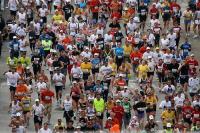Metric racing
- Metric Tags:
The student-teacher brought us all into the back of the classroom and went over the recipe. It was elementary school and we were making metric brownies.
What's a metric brownie?
Same as a regular brownie, only using a recipe that uses metric measurements.
Perhaps some of you remember that, the movement in the early 1980s to get Americans to convert to the metric system. I have no idea if it was a serious move, if it was purely an educational move or what even happened to the supposed "movement."
Regardless of the cooking lesson, the metric system is still a bit of a reach for me. Actually it's not the metric system per se but the conversion from English measurement system.
Which brings me to Sunday's race in Muskoka.
Since the race is in Canada, all the course measurements for the bike and the run will be in meters,not miles.
And actually for this, I am grateful.
My first half marathon was last September in St. Catharines, Ontario -- the Run for the Grapes. Not even thinking about the measurement system, it was pretty early when my friend and I realized the course was marked in meters.
Frankly, I kind of panicked.
"How many meters are in 13.1 miles?" I asked him frantically.
Some conversions are routine by now. For instance, 5 kilometers is 3.1 miles. But 13.1 miles? That was too much math to figure out while running.
But once I knew it was around 20km (21.1 to be exact) and replenished my nutrition (math is a personal sign that I'm approaching a bonk) the kilometers were very enjoyable.
It was all psychological.
Which is why the kilometers will be helpful at Muskoka 70.3.
Yes 21.1km is a bigger number than 13.1 -- and same on the bike where 94km is bigger than 58 miles -- but that means participants see race markers more often.
So what if I have to get all the way to 21.1km -- those kilometer markers will come quickly. It breaks the race up into smaller segments. When attempting to be in the moment and look only at what is ahead of me, the smaller the increment, the better. Plus it makes me feel like I'm making progress as the numbers keep ticking off.
The tactic may not help as much on the bike, where the focus will be on each hill. But It has been helpful on the swim, where concentrating on moving from buoy to buoy make the distance seem less daunting. And so it certainly should help on the run. Those kilometers come up quicker than those miles, and so regardless of what pace I'm actually running, it should feel like progress toward the finish line.
The smaller the segments, the less I have to worry about.
--- Amy Moritz
source: http://blogs.buffalonews.com/journey_to_the_finish_lin/2009/09/metric-ra...

Comments
1
1
1
1